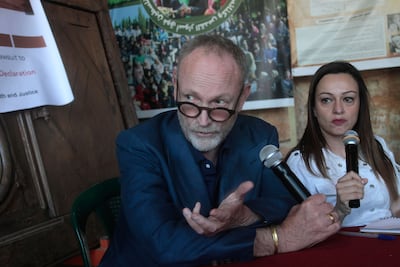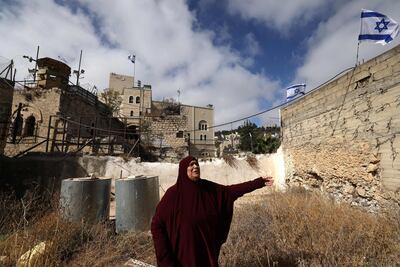A group of Palestinians has launched a legal petition seeking an apology from the UK government for alleged human rights abuse during the British Mandate of Palestine.
Backers say the UK must face up to its involvement in the Israel-Palestine conflict and abuse allegedly committed by British colonial forces during their occupation from 1917 to 1948, including an “unlawful role in the partition of Palestine”.
The petition to Prime Minister Keir Starmer will be handed in at Downing Street by the group on Wednesday. It has also been addressed to Foreign Secretary Yvette Cooper, Defence Secretary John Healey and Attorney General Richard Hermer.
The 400-page legal document records “incontrovertible evidence” of British human rights abuse, which the group says would have breached legal standards of the time, and details the legacy of the Balfour Declaration of 1917, which expressed support for the creation of a home for Jewish people in Mandatory Palestine.
It was drafted with the involvement of Ben Emmerson KC, a prominent British barrister known for representing the widow of Russian defector Alexander Litvinenko, and Ukraine in a series of cases against Russia following its annexation of Crimea in 2014.
He was in Nablus in the occupied West Bank on Monday speaking at a press conference about the petition.

The petition asks that Mr Starmer’s government makes an apology in the House of Commons, to “acknowledge these internationally wrongful acts of its predecessors as a precondition for the examination of such other ways in which it can make reparations and offer satisfaction to the Palestinian people".
It also asks the government to search for and make public any “remaining evidence and information” of British human rights abuse not yet released in the National Archives.
The petition accuses the UK of “bearing its own responsibility” for the current humanitarian crisis in Gaza. “Palestinians face their gravest crisis since 1948. The inhumanity of the present situation is intolerable … the United Kingdom bears its own distinct responsibility for the present-day catastrophe. It is in a unique position to make a difference, because it owes a special debt to the Palestinian people.”
The group of 14 is led by 91-year old Palestinian businessman and philanthropist Munib Al Masri, a close friend of the late Palestinian leader Yasser Arafat and who served as a minister without portfolio in his cabinet.
“Britain can only play its part in building a just peace in the region today if it acknowledges its defining role in the horrors of the past. An apology would be a just start to what Palestinians expect from the British government,” Mr Al Masri said.
The petition did not set a date for the government to respond, but rather asked for it to be done “with due diligence but expedition”.
Dr Victor Kattan, one of the legal experts involved in drafting the document, said it could take the UK government at least six months to conduct a preliminary investigation and draft a response.
The petition’s wider aim is to “provoke a conversation about the past” across UK society, Dr Kattan said. “One of the aims is publicity. It’s a campaign.”
In the event that the UK government does not respond or declines to move ahead with the letter’s demands, the group will consider requesting a judicial review in English courts. “There’s the possibility for a judicial review, but we don’t want that to happen,” Dr Kattan said.
Also involved were Danny Friedman KC, British-Israeli historian Avi Shlaim, international law expert Prof John Quigley.
Solicitor John Halford, of Bindman’s LLP, is representing the group and told The National there were similarities with the UK's apology for the Batang Kali massacre in colonial Malaya in 1948 earlier this year, after years of campaigning from the victims' families.
The UK has issued five such apologies, including Batang Kali.
The petition claims that by issuing the Balfour Declaration, Britain reneged on its promises to recognise a Palestinian state in correspondence between Sir Henry McMahon, high commissioner for Egypt, and Sharif Hussein bin Ali, of the kingdom of Hijaz.
It also views the colonial occupation of Palestine as “illegal”, resulting in policies “that caused irrevocable damage to the integrity” of the Palestinian people. British forces breached their obligations as an occupying power with the methods they used to repress the Arab rebellion of 1933-1936.
The petition also accuses the British colonial power of “failing to protect” Palestinian Arabs from the consequences of partition after Britain withdrew from the region in 1947.
Mr Al Masri was born in Nablus and educated at schools in Lebanon and university in Texas. In his witness statement, he recalled being shot in the leg aged 13 by British forces during a demonstration in 1947, and said he still suffers from pain around the scar.
His fortune was made through the Edgo Group, an engineering company serving the oil and gas industry that he founded and managed from London. He first met Mr Arafat in Algeria while working with Philips Petroleum and later served as a minister in the Jordanian government.
In 1993, “anticipating the challenges the new government foreshadowed by the Oslo Accords would face”, he founded the Palestinian Investment and Development Company, with the aim of boosting the Palestinian economy.
He became a minister with the newly formed Palestinian Authority in 1994.
The Palestinian signatories include Walid Najib Mustafa Al Ahmad, whose family owned “significant amounts of land” in Maria Ibn Jaber, in what is now Israel, which they were expelled from and never regained access to return.
Ahmad Mahmoud Abusalo’om was born in a refugee camp in Nablus, after his family fled Hebron. One of his great uncles was killed in a massacre during Operation Yoav in October 1948.

Ghussoun Abdullah Ahmad Abdou was born in Yarmouk refugee camp after her family fled their homes in the Galilee region and none of her relatives have been allowed to return since.

